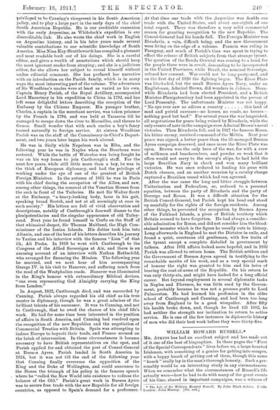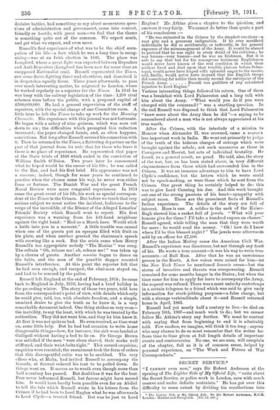WILLIAM HOWARD RUSSELL* MR. Anrrircs has had an excellent subject
and has made out of it one of the best of biographies. In these pages the "First of the Special Correspondents " lives before us, a large-hearted Irishman, with something of a genius for getting into scrapes, with a happy knack of getting out of them, though this same " knack " really lay in the man's thorough honesty. Such a per- sonality would be an interesting study in any circumstances. When we remember what the circumstances of Russell's life actually were—how he bad to do with many of the great events of his time, shared in important campaigns, was a witness of
• The Life of Sir W4liam Howard Russell. By John Black Atkins. 2 1-ols. London: John Murray. [30s. net.]
decisive battles, bad something to say about momentous ques- tions of administration and government, came into contact, friendly or hostile, with great men—we feel that the theme is something quite out of the common. We expect much, and get what we expect, and even more.
Russell's first experience of what was to be the chief occu- pation of his life—a fact which he was a long time in recog- nising—was at an Irish election in 1841. The place was Longford, where a great fight was expected between Repealers and Anti-Repeaters (Longford has been now for some time an unopposed Nationalist seat). Russell represented the Times, saw some fierce fighting there and elsewhere, and described it in despatches equally fierce. Three years afterwards, to pass over much interesting matter, he migrated to London, where he worked regularly as a reporter for the Times. In 1845 he was busy with the railway legislation of the time : 1,200 rival schemes were before the public, with a proposed capital of £500,000,000. He had a general supervision of the staff of reporters, with the special charge of one Committee room. A little later he left the Times to take up work for the Morning Chronicle. His experience with this journal was not fortunate. He began with a salary of nine guineas, which was soon cut down to six ; the difficulties which prompted this reduction increased ; the paper changed hands, and, as often happens, convictions. Not long after Russell severed his connection with it. Then he returned to the Times, a flattering departure on the part of that journal from its rule that for those who leave it there is no place of repentance. He represented that paper at the State trials of 1848 which ended in the conviction of William Smith O'Brien. Two years later he commenced what he hoped would be the career of his life ; he was called to the Bar, and had his first brief. His appearance was not a success ; indeed, though for some years he continued to practise when the chance came his way, he never won either fame or fortune. The Danish War and the great French Naval Review were more congenial experiences. In 1854 came the great event of his life, his work as special correspon- dent of the Times in the Crimea. But before we touch that very serious subject we must notice the incident, ludicrous to the verge of the incredible, of the Dinner of the Alleged Lunatics' Friends' Society which Russell went to report. His first experience was a warning from his left-hand neighbour against the right hand " Mad as a March hare. Would stick a knife into you in a moment." A little trouble was caused when one of the guests put an epergne filled with fruit on his plate, and when another greeted the chairman's speech with crowing like a cock. But the crisis came when Henry Russell's too appropriate melody " The Maniac " was sung. The refrain " Oh, release me! oh, release me!" was taken up by a chorus of guests. Another convive began to dance on the table, and the man of the possible dagger resented Russell's interference. At this point the reporter felt that be had seen enough, and escaped; the chait man stayed on, and had to be rescued by the police.
Russell left England at the end of February, 1854; he came back to England in July, 1856, having had a brief holiday in the preceding winter. The story of these two years, told here from the correspondent's point of view, with details which only he could give, told, too, with absolute freedom, and a simple, unmixed desire to give the truth as he knew it, is a very remarkable document indeed. One thing strikes us very soon— the incivility, to say the least, with which he was treated by the authorities. They did not want him, and they let him know it. At first it was not quite so bad. He evenreceived, as time went on, some little help. But he had had occasion to write home disagreeable things—bow, for instance, the sick were landed at Gallipoli without having a bed to lie on. Sir George Brown was satisfied if the men "were clean shaved, their necks well stiffened, and their waist-belts tight." This caused enquiries; enquiries were resented; the resentment took the form of orders that this disrespectful critic was to be snubbed. The very officer who, at Malta, had invited Russell to accompany the Guards, at Scutari ordered his tent to be pulled down. So things went on. It moves us to wrath even though more than half a century has passed. But doubtless it was for the best. Fear never influenced Russell, but favour might have moved him. It would have hardly been possible even for an Abdiel to tell the tale which Russell wrote in his letters from the Crimea if he had been to Lord Raglan what he was afterwards to Lord Clyde—a trusted friend. But was he just to Lord
Raglan?- Mr. Atkins gives a chapter to the question, and answers it ver7fairly. We cannot do better than quote a pai6
of his conclusions :—
" He was animated in the Crimea by the simplest emotions—a vast pity and a generous indignation. If he ever sacrificed individuals he did so accidentally, or indirectly, in his general exposure of the mismanagement of the Army. It would, be absurd to pretend that he was right in every detail of his Criticism ; he was human—very human—and he was an Irishman. But it is safe to say that but for his courageous testimony Englishmen would never have known of the real condition in which their soldiers lived and died upon that terrible plateau before Sebas- topol, would never have leaped Ix ith splendid anger to the rescue, and, finally, would never have laitned that the. English ticopS did something far nobler than merely second the enterprise of the French Army Russell was guiltless of any calculated injustice to Lord Raglan."
Various interesting things followed his return. One of them was a breakfast with Lord. Palmerston and a long talk with
him about the Army. " What would you do if you were charged with the command ? " was a startling question. In
the end Russell was disposed to think that Lord Palmerston "knew more about the Army than be did "—a saying to be remembered about a man who is not always appreciated at his true worth.
After the Crimea, with the interlude of a mission to Moscow when Alexander II. was crowned, came a scarce.)
less important work in India. He went out primarily to judge of the truth of the hideous charges of outrage which were brought against the rebels ; not such massacres as those in Cawnpore and Meerut, but acts of individual brutality. He found, as a general result, no proof. He told, also, the story of the war, but, as has been stated above, in very different circumstances from those which had surrounded him in the Crimea. It was an immense advantage to him to have Lord Clyde's confidence, but the letters which he wrote could not be epoch-making, as were those which he sent from the Crimea. One great thing he certainly helped to do: this was to give Lord Canning his due. And this work brought out one of the strong passions of his heart—sympathy with subject races. These are the prominent facts of Russell's Indian experience. The details of the story are full of interest. Here is one. A soldier in the sack of the Kaiser- Bagh showed him a casket full of jewels. " What will your honour give for these ? I'll take a hundred rupees on chance." Russell agreed, while telling the man that they were worth far more : he would send the money. " Oh ! how do I know where I'd be this blessed night ? " The jewels were afterwards sold by an officer for £7,500.
After the Indian Mutiny came the American Civil War.
Russell's experience was disastrous, but not through any fault of his. He wrote a true account—it was his way to write true accounts—of Bull Run. After that he was an unwelcome person in the North. A few voices were raised for him—let the New York Times be mentioned honoris causa—but the storm of invective and threats was overpowering. Russell remained for some months longer in the States ; but when the time came for him to apply for leave to accompany the Army, the request was refused. There was a most unlucky contretemps in a certain telegram to a friend which was said to give early information for stock-jobbing purposes—a false charge, but with a strange verisimilitude about it—and Russell returned home in April, 1863.
Russell had yet nearly half a century to live—he died on_ February10th, 1907—and much work to do ; but we cannot follow Mr. Atkins's story any further. We must be content with saying that from beginning to end it is admiriblj told. Few readers, we imagine, will think it too long : anyone who may chance to do so must remember that the writer hat from time to time given at full length details of important events and controversies. No one, we are sure, will complain of the chapter, full as it is of common sense, helped by personal experience, on "The Work and Future of War Correspondents."







































 Previous page
Previous page